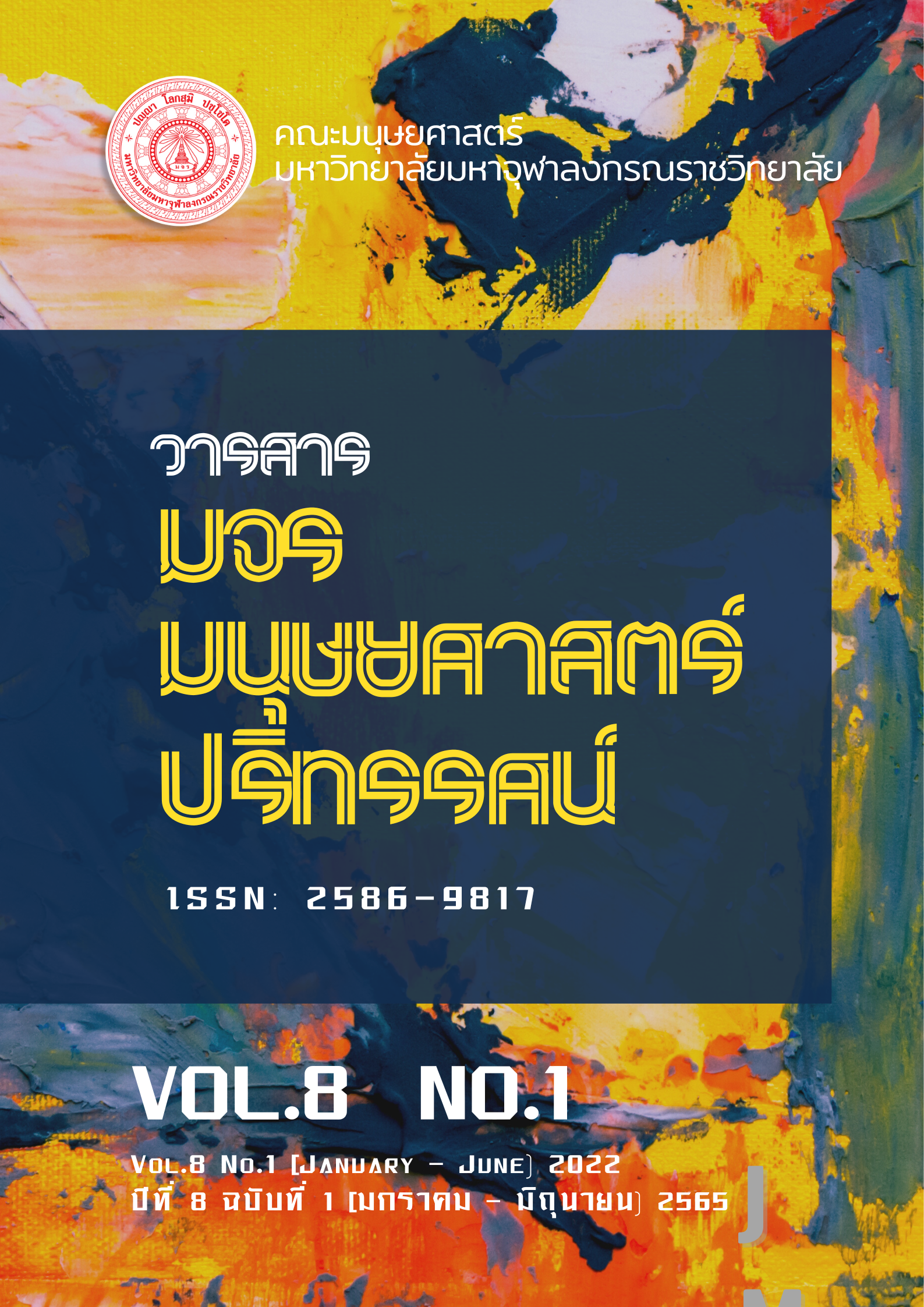พุทธจิตวิทยา : การให้คำปรึกษาในพระพุทธศาสนา
คำสำคัญ:
พุทธจิตวิทยา, การให้คำปรึกษา, พระพุทธศาสนาบทคัดย่อ
บทความวิชาการนี้มุ่งวิเคราะห์ความหมายของการให้คำปรึกษาเชิงพุทธจิตวิทยา แนวคิดการให้คำปรึกษาเชิงพุทธจิตวิทยา เป้าหมายของการให้คำปรึกษาเชิงพุทธจิตวิทยา ลักษณะของผู้ให้คำปรึกษาเชิงพุทธจิตวิทยา และขั้นตอนและกระบวนการให้คำปรึกษาเชิงพุทธจิตวิทยา การให้คำปรึกษาเชิงพุทธจิตวิทยา เป็นกระบวนการที่พัฒนาสติปัญญาและเยียวยาจิตใจของบุคคลผู้มีความทุกข์ให้พ้นจากทุกข์ รวมทั้ง ช่วยพัฒนาจิตใจของบุคคลให้สามารถอยู่กับการเปลี่ยนแปลงและเผชิญหน้ากับปัญหาต่าง ๆ ได้อย่างเข้าใจ การให้คำปรึกษาเชิงพุทธจิตวิทยา ใช้หลักอริยสัจมาเป็นแนวคิดในการให้คำปรึกษา เพราะมุ่งให้บุคคลเข้าใจถึงความเป็นจริงตามธรรมชาติของสรรพสิ่ง รู้จักสาเหตุของปัญหา วิธีการแก้ไขปัญหา ตลอดจนเยียวยารักษาให้พ้นจากความทุกข์ การให้คำปรึกษาเชิงพุทธจิตวิทยาสามารถทำให้ผู้มารับคำปรึกษาเกิดการเปลี่ยนแปลงในด้านต่าง ๆ เช่น ด้านพฤติกรรม ด้านอารมณ์ ด้านจิตใจ และด้านทัศนคติต่อโลกและชีวิต ดังนั้น การให้คำปรึกษาแก่บุคคลในแต่ละครั้ง พระพุทธองค์ทรงมีเป้าหมายที่ชัดเจนในการพัฒนาเปลี่ยนแปลงพฤติกรรมและทัศนคติของผู้มารับคำปรึกษาไปในทางที่ดีขึ้น โดยเฉพาะการบรรลุธรรมขั้นใดขั้นหนึ่งรวมถึงการเข้าถึงพระนิพพานและดับความทุกข์ได้ในที่สุด
เอกสารอ้างอิง
ประทีป พืชทองหลาง. (2556). รูปแบบการปรึกษาเชิงพุทธตามหลักกัลยาณมิตร (วิทยานิพนธ์พุทธศาสตรดุษฎีบัณฑิต). มหาวิทยาลัยมหาจุฬาลงกรณราชวิทยาลัย. พระนครศรีอยุธยา.
พระครูปลัดมารุต วรมงฺคโล. (2553). การศึกษาวิเคราะห์พุทธจิตวิทยาในพระไตรปิฎก (รายงานการวิจัย). กรุงเทพฯ : มหาวิทยาลัยมหาจุฬาลงกรณราชวิทยาลัย.
พระเทพเวที (ประยุทธ์ ปยุตโต). (2532). การศึกษาที่สากลบนฐานแห่งภูมิปัญญาไทย. กรุงเทพฯ : บริษัทอมรินทร์ พริ้นติ้งกรุ๊พ จำกัด.
พระธรรมปิฎก (ประยุทธ์ ปยุตฺโต). (2546). พุทธธรรม ฉบับปรับปรุงและขยายความ : มัชเฌนธรรมเทศนา/มัชฌิมาปฏิปทา หรือ กฎธรรมชาติและคุณค่าสำหรับชีวิต (พิมพ์ครั้งที่ 11). กรุงเทพฯ : มหาวิทยาลัยมหาจุฬาลงกรณราชวิทยาลัย.
พระพรหมคุณาภรณ์ (ป.อ. ปยุตโต). (2551). พจนานุกรมพุทธศาสตร์ ฉบับประมวลธรรม. นนทบุรี : บริษัท เอสอาร์พริ้นติ้งแมสโปรดักส์ จำกัด.
“_______”. (2545). พุทธศาสตร์กับการแนะแนว (พิมพ์ครั้งที่ 7). กรุงเทพฯ : กองทุนวุฒิธรรมเพื่อการศึกษาและปฏิบัติธรรม.
“_______”. (2546). พจนานุกรมพุทธศาสน์ ฉบับประมวลศัพท์. กรุงเทพฯ : มหาจุฬาลงกรณราชวิทยาลัย.
“_______”. (2550). ธรรมนูญชีวิต. กรุงเทพฯ : สำนักพิมพ์จันทร์เพ็ญ.
มหาวิทยาลัยมหาจุฬาลงกรณราชวิทยาลัย. (2539). พระไตรปิฎกภาษาไทย ฉบับมหาจุฬาลงกรณราชวิทยาลัย. กรุงเทพฯ : มหาวิทยาลัยมหาจุฬาลงกรณราชวิทยาลัย.
มั่นเกียรติ โกศลนิรัติวงษ์. (2541). พุทธธรรมทฤษฎีและเทคนิคการให้คำปรึกษา. กรุงเทพฯ : สำนักพิมพ์สุวิริยาศาสน์.
โสรีย์ โพธิ์แก้ว. (2553). จากจิตวิทยาสู่พุทธธรรม. นครปฐม : บริษัท วี.พริ้นท์ จำกัด.
อาภา จันทรสกุล. (2545). ทฤษฎีและแนวปฏิบัติในการให้การปรึกษา. กรุงเทพฯ : โรงพิมพ์มหาวิทยาลัยสุโขทัยธรรมาธิราช.
“_______”. (2545). เอกสารการสอนชุดวิชาทฤษฎีและแนวปฏิบัติในการให้การปรึกษา หน่วยที่ 11 หลักธรรมและแนวปฏิบัติในการให้การปรึกษา. กรุงเทพฯ : มหาวิทยาลัยสุโขทัยธรรมาธิราช.
Sucaromana, A. (2016). Resilience Quotient: RQ. Journal of MCU Peace Studies, 4(1), 209-220.

ดาวน์โหลด
เผยแพร่แล้ว
รูปแบบการอ้างอิง
ฉบับ
ประเภทบทความ
หมวดหมู่
สัญญาอนุญาต
ลิขสิทธิ์ (c) 2022 วารสาร มจร มนุษยศาสตร์ปริทรรศน์

อนุญาตภายใต้เงื่อนไข Creative Commons Attribution-NonCommercial-NoDerivatives 4.0 International License.





